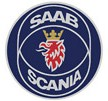Saab-Scania
 | |
| Predecessors | |
|---|---|
| Founded | 1969 |
| Defunct | 1995 |
| Fate | Split |
| Successors | |
| Headquarters | Sweden |

Saab-Scania AB was a Swedish vehicle manufacturer that was formed from the 1969 merger of Saab AB and Scania-Vabis. The company was split in 1995.
History
Truck and bus manufacturer Scania AB of Södertälje merged with car and aeroplane manufacturer Saab AB of Trollhättan on 1 September 1969,[1][2] under the Wallenberg family group of companies. The merger meant that Saab no longer had to import the British Triumph Slant-4 engine, and could instead use the engine production facilities of Scania. In 1972 they started manufacturing the 2.0 L B version. In 1977, Saab took advantage of Scania's experience with turbochargers and added one to the engine, thus creating one of the earliest turbocharged automobile engines to be produced in large numbers.[citation needed]
When the corporation was split in 1995, the name of the truck and bus division changed back to Scania AB. Saab Aircraft (Saab AB) and Saab cars were also split, with General Motors buying a major holding in Saab Automobile AB.
Divisions
Saab-Scania consisted of following divisions:
- Aircraft (traded under the Saab AB brand) – until 1995
- Cars (traded under the Saab Automobile brand) – until 1990
- Trucks & Buses (traded under the Scania brand) – until 1995
Subsidiaries
Saab-Scania had following subsidiaries:
- AB Svenska Järnvägsverkstädernas Aeroplanavdelning (ASJA) – until 1981
- Jönköping – until 1983
- Nordarmatur – until 1983
- Parca Norrahammar – until 1983
- MJ – until 1984
- Enertech – to 1988
- Combitech – from 1982 to 1995
- Saab-Valmet – from 1968 to 1992
See also
- Marcus Wallenberg-hallen – Scania Museum in Södertälje, Sweden
- Swedish Air Force Museum – aircraft museum in Linköping, Sweden
References
- ^ Berg, Jørgen Seemann (1995). King of the road i femti år: Norsk Scania AS 1945–1995 (in Norwegian). Oslo, Norway: Norsk Scania AS. p. 85. ISBN 82-993693-0-4.
- ^ Gunston, Bill (2005). World Encyclopedia of Aircraft Manufacturers, 2nd Edition. Phoenix Mill, Gloucestershire, England, UK: Sutton Publishing Limited. p. 164. ISBN 0-7509-3981-8.
Further reading
- Olson, Björn (1988). The Saab-Scania Story. Stockholm: Streiffert & Co. ISBN 9178860148.
